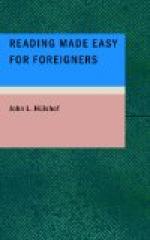Father, Thou lead
me.
Lead me to victory, lead me to death;
Lord, at Thy pleasure I offer my breath.
Lord, as Thou wilt, so lead
me.
God, I acknowledge
Thee.
God, I acknowledge
Thee.
So when the thunders of battle are breaking,
As when the leaves of the autumn are shaking,
Fountain of grace, I acknowledge
Thee.
Father, Thou bless
me.
Father, Thou bless
me.
Into Thine hand I my being resign;
Thou didst bestow it—to take
it be Thine.
Living and dying, O bless
me.
Father, I honor
Thee.
Father, I honor
Thee.
Not for earth’s riches unsheath
we the sword;
’Tis our hearts we protect; ’tis
Thy temples, O Lord;
So railing or conquering,
I honor Thee.
To Thee, God,
I yield me.
To thee, God,
I yield me.
Round me when death’s fiery tempest
is rushing,
When from my veins the red currents are
gushing,
To Thee, O my God, do I yield
me.
Father, I call
to Thee.
Theo. Koerner.
LESSON XXXIV
FRANKLIN’S TOAST
Long after Washington’s judicious and intrepid conduct in respect to the French and English had made his name familiar to all Europe, Dr. Franklin chanced to dine with the English and French ambassadors, when the following toasts were given:—
The British ambassador, rising, said: “England,—the sun whose bright beams enlighten and fertilize the remotest corners of the earth.”
The French ambassador, glowing with national pride, but too polite to dispute the previous toast, said: “France,—the moon whose mild, steady, and cheering rays are the delight of all nations, consoling them in darkness, and making their dreariness beautiful.”
Dr. Franklin then arose, and, with his usual dignified simplicity, said: “George Washington,—the Joshua who commanded the sun and moon to stand still, and they obeyed him.”
LESSON XXXV
HUMANITY REWARDED
Joseph the Second, Emperor of Germany, once received a petition in favor of a poor old officer, with a family of ten children, who was reduced to the utmost poverty.
After making inquiries respecting the man, and satisfying himself of his worth, the Emperor determined to judge of his necessities by personal observation.
Accordingly he went alone to the house of the officer, whom he found seated at table, with eleven children around him, dining upon vegetables of his own planting.
The Emperor, who was disguised as a private citizen, after some general conversation with the officer, said: “I heard you had ten children, but I see here eleven.”
“This,” replied the officer, pointing to one, “is a poor orphan, whom I found at my door. I have endeavored to obtain for him the assistance of persons who could better afford to provide for him, but have not been able to succeed; and of course, I could do no better than share my little portion with him.”




